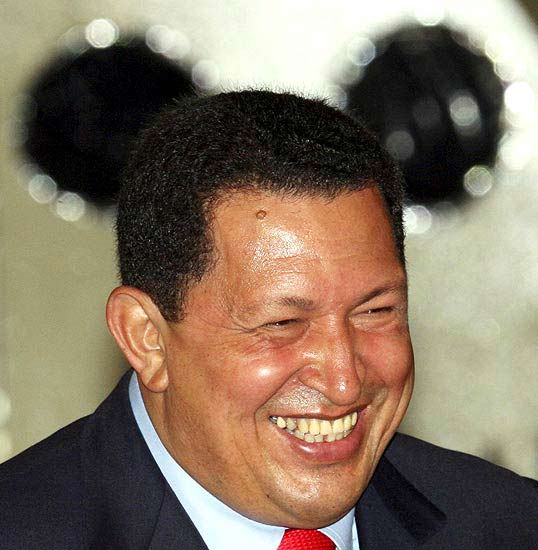Really interesting new yorker article on Hugo Chavez. He’s a real Huey Long character.
He knows how to put on a show:
Chávez then had a surprise: the FARC, he said, had just informed him that it was prepared to release six more hostages. Uribe spoke in urgent whispers with his aides. Chávez asked President Fernández if protocol could be broken to allow the mother of Ingrid Betancourt to come into the hall. After some commotion, Betancourt’s mother, Yolanda Pulecio, an elegant woman in her late sixties (and a former Miss Colombia), entered. With her was Piedad Córdoba, a flamboyant left-wing Colombian senator who has worked with Chávez in negotiations with the FARC, and who was wearing a white turban. Uribe looked furious; Chávez was showing that he, not Uribe, was the one who could save the hostages’ lives.
By now, some eight hours had gone by, and waiters brought the leaders plates of food while they talked. Finally, an agreement was worked out, as part of which Uribe promised, reluctantly, not to conduct new cross-border raids. Fernández asked Uribe and Correa to embrace. After some hesitation, they shook hands. Chávez walked up to Uribe and greeted him, too, and the crisis seemed to be at an end. Then, moments later, Correa began berating Uribe, who bristled. The other leaders in the room looked alarmed. Chávez swiftly spoke in mollifying tones to Uribe, who relaxed.
I walked out with Piedad Córdoba and Yolanda Pulecio. Córdoba was gleeful. She said that she and Chávez and Cristina Kirchner had planned everything in detail—the revelation about the new hostages, and Pulecio’s dramatic appearance.
Chávez had shown himself capable of sparking a regional confrontation and then, by defusing it, appearing as the peacemaker. It was similar to the moment in 1992 when he called off his coup attempt. Uribe understood that he had been temporarily outmaneuvered, and had responded to Chávez’s gesture. Both leaders, to an extent, could declare victory, although it was clear that this was just a skirmish in an ongoing conflict.
More seriously, what to do about Venezuela gets the predictably stupid and depressing response from McCain: selective moral outrage about quasi-dictators that don’t torture people for us, which is the new black for Republicans. By contrast, Obama impresses:
On June 7th, Chávez had also said, “Whoever is the next President of the United States, I’d like to start preparing the way to start working together.” When I asked Ana Navarro, an adviser to Senator John McCain, the presumptive Republican nominee, about the offer, she said, “Senator McCain thinks that Chávez is a charlatan and a thug. The Senator doesn’t trust Chávez, and does not think it worth getting into a back-and-forth with him.” Last year, Senator Barack Obama was asked in a debate if he would be willing to meet with leaders who are hostile to the United States—Iran’s Mahmoud Ahmadinejad, Chávez, and Castro—“without precondition.” Obama answered that he would, prompting Senators McCain and Hillary Clinton to suggest that he was naïve. Obama subsequently said that high on his agenda in any talks with Chávez would be addressing “the fomentation of anti-American sentiment in Latin America,” and “his support of the FARC in Colombia,” which, he said, was “not acceptable.
